David Tickner's Blog, page 33
April 5, 2021
Blue
 Blue moon. Blue in the face. The blues. True blue. Blue stocking. Blue movies. Blue ribbon. Cursing a blue streak. Blue grass. Blueprints. Blue murder. Blue balls. Blue plate special. A bolt from the blue. Blue suede shoes (remember this one?!). Out of the blue. Bluebeard. Feeling blue. Blue chip. Blue pencil. Blueberries. Bluetooth. Blue collar. Blue jeans. Blue blood. Bluenose (a nickname for Nova Scotians since the 17th century). Have you been at a meeting lately in which someone suggested, “Let’s do some blue sky thinking...”?
Blue moon. Blue in the face. The blues. True blue. Blue stocking. Blue movies. Blue ribbon. Cursing a blue streak. Blue grass. Blueprints. Blue murder. Blue balls. Blue plate special. A bolt from the blue. Blue suede shoes (remember this one?!). Out of the blue. Bluebeard. Feeling blue. Blue chip. Blue pencil. Blueberries. Bluetooth. Blue collar. Blue jeans. Blue blood. Bluenose (a nickname for Nova Scotians since the 17th century). Have you been at a meeting lately in which someone suggested, “Let’s do some blue sky thinking...”?Can you think of words that are as versatile and as widely used in idioms and colloquial language as the word blue? Blue is the basis for dozens of common idioms and phrases covering a wide range of meanings and uses.
Ever wondered why blue is associated with boy babies and pink with girl babies? This color coding became predominant in the 20th century. Before that pink (or red) was the boy color and blue was the girl color; that is, if there was any differentiation at all. There is considerable debate about if and when this color-coding shifted.
Where does the word blue come from? The word blue has always been (more or less) blue. The word has not changed much in hundreds (or thousands) of years. Blue comes from Proto-Indo-European (PIE) bhle (blue, light-colored), PIE bhel (to shine), and, later, Proto-Germanic bloewaz, the source of Old Saxon and Old High German blao, Danish blaa, Swedish bla, Old Frisian blau, Middle Dutch bla, Dutch blauw, German blau, and Old English blaw—all meaning blue. Around 1300 the word bleu, meaning the color of the clear sky, arrives in English from Old French bleu.
The present spelling, blue, is from the 1500s.
Reference: Online Etymological Dictionary, https://www.etymonline.com/
Published on April 05, 2021 20:48
April 2, 2021
Easter Rabbits, Hares, Bunnies, Coneys??
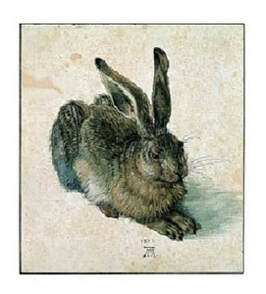 Did you know that rabbits are not native to North America or northern Europe? What most people call rabbits are actually hares except for an animal called the Belgian Hare which is actually a rabbit. A rabbit is a young coney. Coney was also a rude slang word for a female body part which is why you don’t often hear that word anymore. A bunny was also the name for a squirrel. Aren’t words fun?!
Did you know that rabbits are not native to North America or northern Europe? What most people call rabbits are actually hares except for an animal called the Belgian Hare which is actually a rabbit. A rabbit is a young coney. Coney was also a rude slang word for a female body part which is why you don’t often hear that word anymore. A bunny was also the name for a squirrel. Aren’t words fun?!Rabbit (or Coney) or Hare?
The word rabbit came to English in the late 14th century and meant the young of a coney; that is, a rabbit was to a coney what a cub is to a bear or what a kitten is to a cat. The word rabbit has an unknown origin, possibly from Walloon robete or Middle Dutch robbe.
The coney is native to Europe (primarily Portugal, Spain, southwest France) and was imported by colonists to places like North America and Australia (in Australia, the coney is considered an invasive species, a pest rather than a pet). Over time, coneys became known as rabbits. Why? What happened to the word coney? Keep reading.
In contrast, the hare is native to Europe, Eurasia, and North America. However, as the word rabbit more and more became the dominant term in North America, the word hare dropped from common use. An exception is a breed called the Belgian Hare which, as just mentioned, is actually a rabbit (or coney). Perhaps you could say that the word rabbit bred like a rabbit!
The word hare comes from Old English hara and various Germanic sources; for example, Old Frisian hasa, Middle Dutch haese, Dutch haas, Old High German haso—all words of uncertain origin, although some sources suggest the word may have come from words meaning grey.
What are some differences between rabbits/coneys and hares? They are two different species of the same animal family.
In brief, rabbits burrow in the ground (i.e., rabbit warrens). Hares have a simple nest above ground. Rabbits are born hairless and blind, requiring close care by the mother. Hares are born relatively mature with hair and good vision. Rabbits tend to live in social groups; hares are relatively solitary. Rabbits are smaller than hares and have shorter ears. Hares have larger and stronger hind legs. Rabbits are commonly bred as livestock and kept as pets; hares have not been domesticated.
Coney
A coney (or cony) came to English around 1200 from Old French coniz and conil and from Latin cuniculus (hare). A baby coney was called a rabbit.
So, whatever happened to the word coney? In the early Middle Ages, the term coney was also a slang term or punning synonym for cunny (a certain part of the female anatomy) and as part of the term connyfogle (to deceive a woman in order to win sexual favors). So, given such sexual connotations, by the 14th century the term rabbit increasingly came to be used rather than coney. Today, the word coney is hardly ever used.
In brief, a coney (i.e., the Old English translation of the Latin word cuniculus meaning hare) came to be known by the term rabbit.
If you know anyone with the surname Cunningham, the next time you see them, you can let them know that the name has the same origin as coney. Cunningham was a place in England where one would assume that there were lots of coneys.
Speaking of place names, Coney Island, the beach resort that is part of metropolitan New York City was named as such in the early 19th century. The origin of the name is unknown. One of many theories is that the island was named for the over abundance of coneys (i.e., rabbits), descendants of the coneys likely brought to the island over the years by early settlers.
Bunny
The word bunny, the pet name for a rabbit, came to English in the 1680s, perhaps from Scottish bun (the tail of a hare), a term from the 1530s, or perhaps from French bon, or perhaps from an unknown Scandinavian source. In the 1580s, the Scottish word bun was also the name for a squirrel. By around 1600 the term bun was also a term of endearment for an attractive young woman or a child. Still with me?
The ‘Bunny Hug’ (1912) was a popular and scandalous dance of the ragtime era. The term bunny, as a Playboy Club hostess, is from 1960.
By the way, if you are from Saskatchewan you will know that a ‘bunny hug’ is the correct name for what people in other places incorrectly call a ‘hoodie’.
Easter bunny
The term Easter rabbit is from 1888 and Easter bunny is from 1904. The term Easter egg is from 1825; before that the term was pace egg (from Latin paschal = Easter), from the 1610s.
If all this talk of rabbits, hares, bunnies, and coneys isn’t confusing enough, how do we explain to children that Easter eggs are delivered by the Easter bunny?
I think that from now on I will stick to simpler words like omphaloskepsis.
Reference: Online Etymological Dictionary, https://www.etymonline.com/
https://nationalpost.com/entertainment/why-saskatchewan-calls-a-hooded-sweatshirt-a-bunny-hug
Published on April 02, 2021 09:47
March 30, 2021
Ticketyboo, Toodeloo
 Have you ever used these words!? Have you heard others use them lately? Do people actually make up such words or do they mysteriously evolve from other words? The origins of these two words are unknown but there are some “likely” ideas of where they came from.
Have you ever used these words!? Have you heard others use them lately? Do people actually make up such words or do they mysteriously evolve from other words? The origins of these two words are unknown but there are some “likely” ideas of where they came from.Ticketyboo is British slang from the 19th century and is most likely from Hindi, “Thik hai, babu” (“It’s all right, sir”). At that time, it is likely that the word babu would have been used, among other uses, by someone speaking to a British colonial official.
In India, you can hear thik hai every day in almost every conversation (thik hai, usually pronounced as teek, teekha, or teekay). Someone might say to someone else, “Thik hai?” (e.g., “Do you understand?”) and the other person will say, “Thik hai” (“Yes, I understand”). The phrase can be a question or a statement depending on the intonation. Thik hai is as common in Hindi as ‘okay’ is in English.
Some sources suggest that ticketyboo may come from French “te que t’es beau” (“how beautiful you are”). I am not an expert but to me this explanation does seem somewhat far fetched.
The word toodeloo likely comes from French “tout á l’heure” (“see you later”) and is likely from the World War I slang of British soldiers.
Reference: Online Etymological Dictionary, https://www.etymonline.com/
https://en.wiktionary.org/wiki/tickety-boo
Published on March 30, 2021 09:10
March 27, 2021
Dude
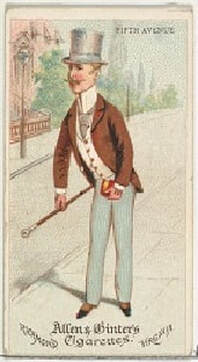 Hey dudes! Where does this word come from, anyway?
Hey dudes! Where does this word come from, anyway?The origins of the word dude are unknown, perhaps from New York City slang of the late 19th century or perhaps a shortening from the song “I’m a Yankee Doodle Dandy” referring to a foppish or over-fastidious male.
The first references to dude are from 1883 when the word ‘dudeism’ was defined as “the dress, manners, and social peculiarities of the class known as dudes” (Century Dictionary).
Here is a lovely quote from a scholarly journal published in July 1883 describing a dude:
“The dude possesses in his outward appearance and bearing all the attributes of a gentleman, excepting, perhaps, that of manliness. His dress is unostentatious in its perfection, its only loud notes being a pair of white gaiters, which are believed to be going out already in obedience to the unwritten code of dudeism. Why the dude feels any interest in life is not clear—he does not look as if he enjoyed it. There is a certain introspective earnestness in his bearing that reminds one of the theological student, and perhaps the prevailing high collar strengthens the resemblance” (Phrenological Journal, July 1883).
In sum, in its origins, the word dude was used to mean an overly fastidious or foppish man.
The word was also used in reference to the so-called ‘aesthetic’ craze at that time and was often applied to city slickers; i.e., Eastern US vacationers visiting the Western US. A female dude was known as a dudine (1883) or as a dudess (1885). The term ‘dude ranch’ (a ranch which entertains guests and tourists for pay) is from 1921.
The term dudette (a woman or girl), from surfer and teen slang, is from 1991.
The term dude, in reference to any male, is first seen in 1966 as part of African-American vernacular.
Reference: Online Etymological Dictionary, https://www.etymonline.com/
Published on March 27, 2021 09:26
March 23, 2021
Wordshop
 Click here for an article and photos of the wordshops of various writers:
Click here for an article and photos of the wordshops of various writers:https://www.theguardian.com/books/2007/mar/02/writers.rooms.david.lodge
Word
In ancient times, a ‘word’ was something spoken or said, not something written. The word ‘word’ has its origins in Proto-Indo-European (PIE) were(3) (to speak, to say) and Proto-Germanic wurda. From these sources, come Old Saxon and Old Frisian word, Dutch woord, Old High German and German wort, Old Norse ord, Gothic waurd, Lithuanian vardas, and Old English word (speech, talk, utterance, sentence, statement, news, report, word).
The word ‘verb’ also comes from PIE were(3), suggesting that a word is not just something you have but something that you do or something that you are (e.g., “May I have a word with you?” mean’s “Let’s talk”). The word ‘verb’ comes to English from Latin verbum (verb; originally, a ‘word’) and Old French verbe (word; part of speech that expresses action or being).
Related words in other PIE-based languages include Avestan urvata (command), Sanskrit vrata (command, vow; e.g., “I give you my word”), Greek rhetor (public speaker; also, rhetoric), Greek rhetra (agreement, covenant), Hittite weriga (call, summon), and others.
In case you are wondering about the use of the word ‘Word’ in Christianity, for example, “In the beginning was the Word” or “the Word of God”, this use of the word ‘word’ has a long and winding history through ancient Greek and Latin. Related terms include Greek logos (a word with many meanings in the ancient world; notably, ‘divine reason immanent in nature’ and ‘truth’) and Latin sermo (conversational discourse), ratio (rational explanation), oratio (speech), and verbum (word).1 Latin, it would seem, has many words for word.
If you weren’t wondering, you didn’t have to read that last paragraph. Just saying.
Shop
The word shop has its origins in the Proto-Germanic root skupp and, later, skoppan (a small structure in addition of a larger structure or other structures). From this source comes Old High German scopf (building without walls, porch), German Scopf (porch, cart-shed, barn), German Schuppen (shed), and Old French echoppe (booth, stall—a word borrowed from German). By around 1300, the word shop (booth or shed for trade or word) had come to English from Old English scoppa and scypen (cow shed), words which also have Proto-Germanic origins.
The word shop, meaning a building or room set aside for the sale of merchandise, is from the mid-14th century. Shop, meaning a schoolroom equipped for teaching vocational arts, is from 1914 American English. The term ‘shop talk’ is from 1860.
Wordshop
As you might expect, a wordshop is a place set aside for working on words. Not that you can’t work on words anywhere; however, a wordshop, like a workshop or a garden, is a space dedicated to imagination, creativity, and technical skills. It is a place in which once you are in the zone, time mysteriously passes without notice—my goodness, it’s noon already!
-o-
1 In his writings, Augustine used both sermo and verbum. When Jerome translated the Bible into Latin (i.e., the Vulgate Bible) in the late 4th century, he used verbum for ‘word’. This became the standard translation for several centuries. In the 1520s, when Erasmus was re-translating the Bible, he used sermo. One source (Ostler, 2016, 77) suggests that Erasmus would have preferred to use oratio but was stymied by its inconvenient female gender. In any case, as noted above, the word ‘word’ in ancient times described something you did or something you were (e.g., a state of being). The word ‘word’ at that time did not mean what it means now in English.
Ostler, N. (2016). Passwords to paradise: How languages have re-invented world religions. New York: Bloomsbury.
Reference: Online Etymological Dictionary, https://www.etymonline.com/
Published on March 23, 2021 20:30
March 21, 2021
Tenacity
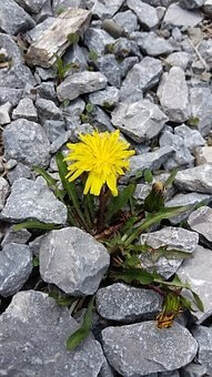 The word tenacity has its origins in the Proto-Indo-European (PIE) root ten (to stretch) and Latin tenere (to hold), tenax (holding fast, gripping, firm, steadfast), and tenacitas (an act of holding fast). By the early 15th century, the word tenacity (quality of holding fast) came to English from Latin via 14th century Old French tenacité.
The word tenacity has its origins in the Proto-Indo-European (PIE) root ten (to stretch) and Latin tenere (to hold), tenax (holding fast, gripping, firm, steadfast), and tenacitas (an act of holding fast). By the early 15th century, the word tenacity (quality of holding fast) came to English from Latin via 14th century Old French tenacité.The word tenacious comes to English around 1600.
In brief, tenacity is the quality or state of being tenacious, of being persistent in adhering to or seeking something valued or desired. Synonyms for tenacious include dogged, insistent, persistent, persevering.
How is tenacity related to perseverance? These two words have very similar meanings.
Persevere has its origins in the PIE root segh (to have, to hold; steadfastness, toughness). The word persevere came to English in the late 14th century meaning to persist in what one has undertaken, to pursue steadily a design or course; from Latin perseverare (continue steadfastly, persist).
Perhaps being tenacious is about holding fast in spite of being ‘stretched’ out of your comfort zone whereas perseverance is ‘sticking’ with something in spite of difficulties.
PIE ten (to stretch) is the source of numerous other English words, including abstention, attend, attenuate, catatonic, contain, contend, detention, distend, entertain, extend, hypotenuse, intend, lieutenant, maintain, obtain, pretend, sustain, tenant, tend, tender, tendon, tenement, tennis, tenor, tense, tension, tent, tenderhooks, tenure, tetanus, tonic, and others. Whew!
PIE ten is also related to words in other languages; for example: Sanskrit tantram (loom), Persian tar (string), Lithuanian tankus (tightened), Greek teinen (to stretch), Greek tenos (sinew), Old Church Slavonic tento (cord), and Old English bynne (thin).
Reference: Online Etymological Dictionary, https://www.etymonline.com/
Published on March 21, 2021 09:03
March 20, 2021
Jargon
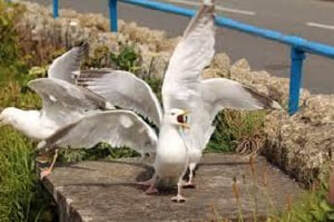 The word jargon comes to English in the mid-14th century meaning unintelligible talk, gibberish, chattering, jabbering from Old French jargon (a chattering of birds). In the late 14th century, the verb jargounen (to chatter, to twitter) comes to Middle English from French.
The word jargon comes to English in the mid-14th century meaning unintelligible talk, gibberish, chattering, jabbering from Old French jargon (a chattering of birds). In the late 14th century, the verb jargounen (to chatter, to twitter) comes to Middle English from French.Earlier, in the 12th century, Old French jargon also meant idle talk or ‘thieves’ Latin’. The word jargon is of echoic origin; that is, the word echoes a sound, for example, the sound of chattering birds. Latin has the word garrire or gaggire meaning to chatter.
In the 1640s, jargon was synonymous with ‘pidgin’ and ‘pidgin English’; that is, people from two different languages trying to communicate using sounds and body language.
Jargon meaning words and phrases used by a particular sect or profession is from the 1650s.
Reference: Online Etymological Dictionary, https://www.etymonline.com/
Published on March 20, 2021 11:50
March 17, 2021
Leprechaun
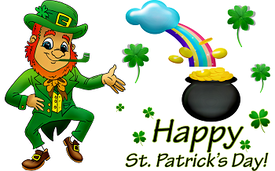 You may be interested or surprised to know that recent research suggests that the word leprechaun has its origins in the ancient Roman rituals of Lupercalia in which young men ran naked through the streets of Rome.
You may be interested or surprised to know that recent research suggests that the word leprechaun has its origins in the ancient Roman rituals of Lupercalia in which young men ran naked through the streets of Rome.First of all, the word leprechaun comes to English around 1600 from Irish lupracan and Old Irish luchorpan (a very small body), from Old Irish lu (little, small) from the Proto-Indo-European root legwh (not heavy, having little weight). Old Irish lu + Latin corp (body) = little body.
So, what’s with leprechauns and Lupercalia? The Luperci were originally bands of aristocratic youth who ran naked through the streets of Roman during the festival of Lupercalia on the 15th of February each year. The Online Etymological Dictionary reports that…
“In the 5th century CE, St Augustine of Hippo compared the Luperci with the Greek werewolves who were believed to change from men into wolves by swimming through a lake in Arcadia. Two centuries later Irish scholars misunderstood Augustine. They thought he meant that the Luperci were an ancient non-human race. Because they could swim they were supposed to have survived Noah's Flood and taken refuge in Ireland. So, in medieval Irish legends the leprechauns or 'little Luperci' still lived under water. The wolf connection was soon forgotten and eventually the 'little Lupercus' became the familiar land-dwelling leprechaun of modern Irish folklore and tourism.” https://www.etymonline.com/search?q=LEPRECHAUN
So, feel free to share this story with your friends over a pint or two of Guinness!
Reference: Online Etymological Dictionary, https://www.etymonline.com/
Published on March 17, 2021 17:22
Astonish
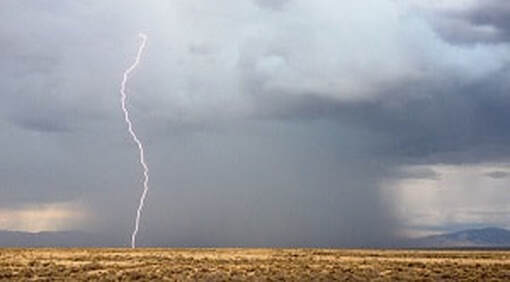 Have you ever been thunderstruck? That is, have you ever been astonished or ‘shocked with wonder’?
Have you ever been thunderstruck? That is, have you ever been astonished or ‘shocked with wonder’?The word astonish has its origins in the Proto-Indo-European (PIE) term s(tene) = to thunder and the Proto-Germanic term thunraz, the source of Old Frisian thuner, Middle Dutch donre, Old High German donar, German Donner, and Old English bunor (thunder, thunderclap). PIE s(tene) is also the source of Sanskrit tanayitnuh (thundering), Persian tundar (thunder), and Latin tonare (to thunder).
The word thunder (the sound produced by lightning) appears in English in the mid-13th century. The word thunderstruck is from the 1610s.
The word astonish comes from Latin extonare (to leave someone thunderstruck); i.e., Latin ex- (out) + tonare (to thunder) and from Old French estoner (to stun, to daze, to deafen, to astound). The word astonish appears in English around 1300 as astonien (to stun, to strike senseless). Astonish, meaning to amaze or to shock with wonder, is from the 1610s.
The noun astonishment (the state of being amazed or shocked with wonder) is from the 1590s (in the 1570s astonishment meant paralysis). Consider how everything seems to stop for a moment when there is a sudden crash of thunder. The adjective astonishing (causing wonder or amazement) is from the 1620s.
The wonder of thunder is astonishing!
Reference: Online Etymological Dictionary, https://www.etymonline.com/
Published on March 17, 2021 09:30
March 14, 2021
Light
 The big bang. Let there be light.
The big bang. Let there be light.yehi (Hebrew: to exist, light)
genetheto phos (Greek: to come into being)
lux sit (Latin: let light exist)
fiat lux (Latin Vulgate Bible: let there be light)
leuk (Proto-Indo-European: light, brightness);
the source of
Armenian lois (light), lusin (moon); Greek leukos (bright, shining, white); Latin lucere (to shine), lux (light), lucidus (clear); Old Church Slavonic luci (light); Lithuanian laukas (pale); Welsh llug (gleam, glimmer); Old Irish loche (lightning), luchair (brightness); Hittite lukezi (is bright);
and the source of
Proto-Germanic leukhtam;
from which comes Old Saxon lioht, Old Frisian liacht, Middle Dutch lucht, Dutch licht, Old High German lioht, German Licht, Gothic liuhap, Old English (Anglian) leht, Old English (West Saxon) leoht – light, daylight; spiritual illumination;
and, at last, to the Old English word
light as brightness, radiant energy, as that which makes things visible,
and, by the 15th century, light as mental illumination.
Let there be light
“Look! It’s not dark!”
Let there be light
“Aha! Now I see what you mean! I get it!”
Let there be light
“Ahhh… Yes.” Awe.
Open eyes. Open mind. Open heart.
Light. Energy. Power. Life.
Reference: Online Etymological Dictionary, https://www.etymonline.com/
https://en.wikipedia.org/wiki/Let_there_be_light
www.davidtickner.ca
Published on March 14, 2021 17:42



